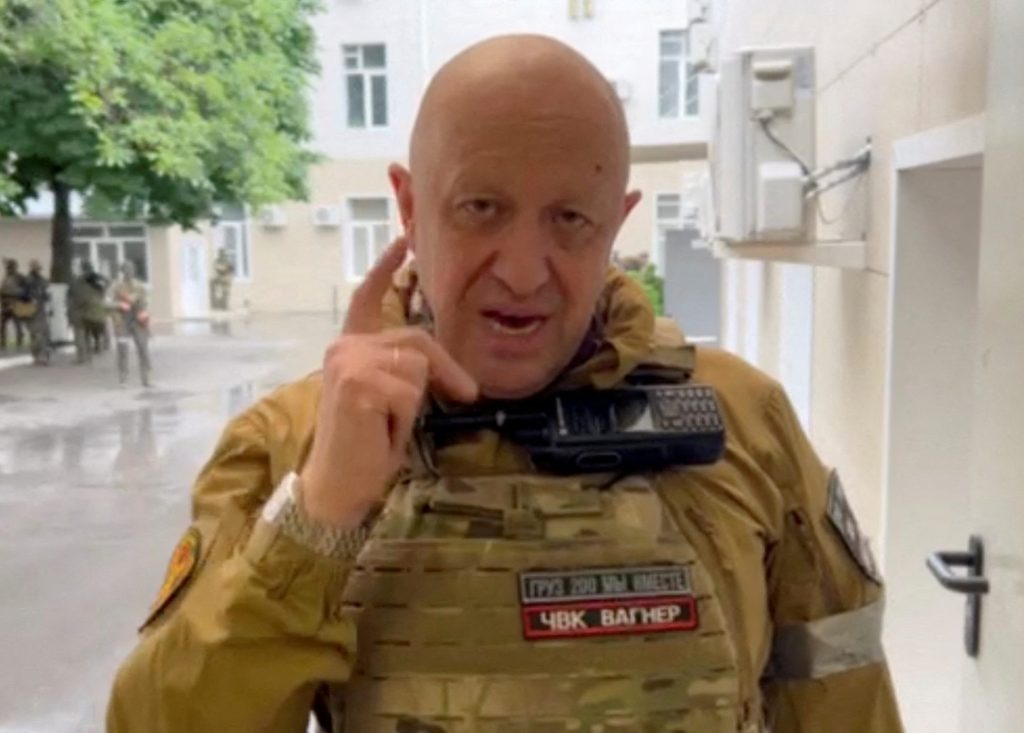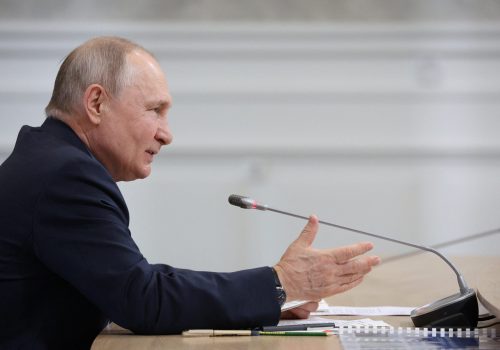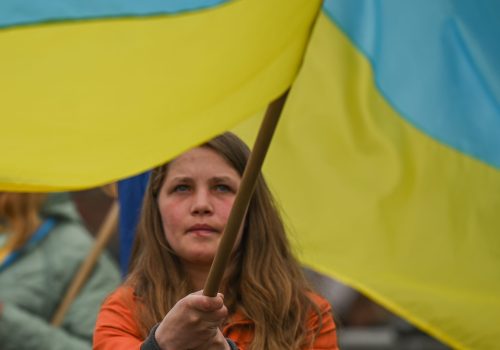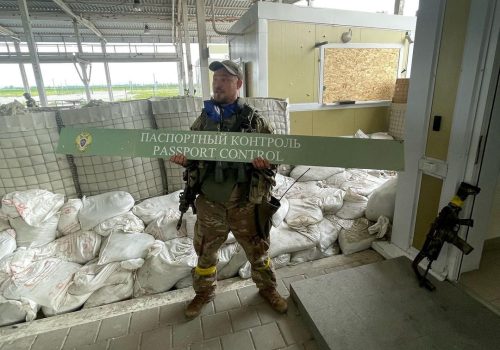As suddenly as it had begun twenty-four hours earlier, Wagner chief Yevgeniy Prigozhin’s rebellion against Russia’s military leadership came to an abrupt end on Saturday evening. The details of the deal struck between Prigozhin and the Kremlin remain murky, but the Russian warlord appears to have emerged from the drama relatively unscathed, at least for now.
The same cannot be said for Vladimir Putin, who has been very publicly humiliated by the affair and now looks weaker than at any point in his twenty-three-year reign. While the mutiny itself was remarkably brief, the consequences are likely to be profound, with serious repercussions in particular for the already faltering Russian invasion of Ukraine.
The most obvious practical consequence of the Wagner mutiny is a weakening of Russia’s force posture inside Ukraine. More than twenty thousand Wagner troops reportedly withdrew from Ukraine to participate in the revolt, representing around five percent of the entire Russian invasion force. Crucially, these were by far the most effective fighting units in the Russian military and had been responsible for almost all of the advances achieved over the past year.
Depending on the exact nature of the agreement to end the mutiny, many Wagner fighters may well return to the frontlines, possibly integrated into the regular Russian army. However, their non-Wagner comrades and commanders will understandably treat them with extreme suspicion, limiting their impact on the battlefield. Whatever happens next, the days when Wagner troops led the Russian invasion of Ukraine look to be over.
Stay updated
As the world watches the Russian invasion of Ukraine unfold, UkraineAlert delivers the best Atlantic Council expert insight and analysis on Ukraine twice a week directly to your inbox.
The revolt also highlighted the relative defenselessness of Russia itself. Wagner troops took almost a year to occupy the small Ukrainian city of Bakhmut but seized the nearly twenty times larger Russian city Rostov-on-Don without a fight in a matter of hours. Indeed, it is worth underlining that Rostov-on-Don is by far the biggest city captured by Russian troops since the start of Putin’s so-called “Special Military Operation” sixteen months ago. Russia’s lack of domestic defenses was further exposed by the unhindered progress of Prigozhin’s armored column, which advanced to within two hundred kilometers of Moscow virtually unopposed before deciding to turn back.
While the immediate threat of a march on Moscow is now over, drastic measures are clearly required to bolster Russian domestic security. Putin knows the watching world has noted this vulnerability. He must now urgently take visible steps to prevent another ambitious Russian warlord or Ukrainian army commander from launching a new campaign inside his unprotected borders. Where will Putin find the necessary troops and equipment for this? With the vast majority of Russia’s military currently deployed in Ukraine, the answer to this question is both obvious and awkward. Russia will have no choice but to reduce its invasion force in order to address the country’s serious domestic security issues.
Russia’s vast military and state security apparatus will also now find itself engaged in the hunt for traitors and possible turncoats, which will inevitably distract attention and resources away from the task of defeating Ukraine. Infighting between the various different military clans has been a debilitating factor throughout the Russian invasion of Ukraine; this trend will now intensify as the Russian authorities look to settle scores with the many police chiefs, local officials, and military commanders who either stood aside or discreetly backed the Wagner mutiny.
Meanwhile, the mutiny has raised some fundamental questions over Putin’s continued ability to rule. He was notably absent during the initial hours of the crisis, only appearing the following morning in a brief video address to the nation. He also seems to have been sidelined in negotiations with Prigozhin, allowing Belarusian dictator Alyaksandr Lukashenka to take the lead. These are not the actions of a strongman ruler. As Atlantic Council Eurasia Center Senior Director and former US Ambassador to Ukraine John Herbst noted on CNN, “It’s like Prigozhin is the person who looked behind the screen at the Wizard of Oz and saw the great and terrible Oz was just this little frightened man. Putin has been diminished for all time by this affair.”
Eurasia Center events

While these factors will all undermine the Russian invasion of Ukraine, the most important impact is likely to be on morale within the ranks of the Russian military. Demoralization was already a major issue for Putin’s invasion force, with a steady stream of video addresses on social media during the first half of 2023 testifying to widespread dissatisfaction among Russian troops over “human wave” attacks and catastrophic losses. These problems will now intensify as Russian troops question the loyalties of their leaders and the entire purpose of the invasion.
On the eve of the mutiny, Prigozhin published an explosive video address in which he accused the Kremlin of deliberately misleading the Russian public over its justifications for the war in Ukraine. The Wagner chief, whom many in Russia see as one of the few credible commentators within the establishment, dismissed key elements of the official Kremlin narrative—including claims that the invasion preempted an imminent NATO-backed Ukrainian offensive against Russian-occupied eastern Ukraine and Crimea. He also directly denied widespread Russian allegations that the Ukrainian military had been bombing eastern Ukraine’s Donbas region for eight years prior to the full-scale invasion. Instead, Prigozhin blamed the war on the personal ambitions of Russian Defense Minister Sergei Shoigu and individual Russian oligarchs.
Such statements will inevitably undermine fighting spirit among Russian troops and cause many to question exactly what they are fighting for in Ukraine. This has long been an issue for the Russian authorities, who have struggled to articulate their war aims amid lurid but unsubstantiated claims of “Ukrainian Nazis” and “Western imperialists.” Prigozhin’s damning comments exposing the lies used to justify the war have now cast an unforgiving light on the Kremlin’s credibility problems and will further fuel discontent among the Russian troops who are fighting and dying on the frontlines.
The short-lived Wagner mutiny has also exposed deep divides within Russia’s military and security establishment that indicate remarkably low levels of loyalty to the Putin regime. There has been some speculation that Prigozhin received support from within the military when planning and executing his mutiny, given that he was able to capture Rostov-on-Don with such apparent ease despite the fact that the city serves as the headquarters of the entire Ukraine invasion. Prigozhin’s armored column of Wagner troops then travelled hundreds of kilometers through the heart of Russia without encountering any significant military resistance.
The remarkable initial success of the Wagner mutiny in seizing control of a major city and advancing on the capital has sent shock waves through Russia that will also be felt by Putin’s occupation forces in Ukraine. If Russian soldiers and commanders are not prepared to defend their own country, why should troops deployed to Ukraine sacrifice themselves for such an apparently dubious cause? If Prigozhin and his private army can go unpunished for declaring war on the Russian state, why should ordinary mobilized Russians feel obliged to follow suicidal orders in Ukraine?
For obvious reasons, the Kremlin will now attempt to downplay the significance of the short-lived Wagner mutiny. In reality, however, the ramifications of this unprecedented event will reverberate for some time to come and will shape Russia’s future, including the outcome of the war in Ukraine. One year ago, Putin was boasting of returning historically Russian lands and comparing himself to Peter the Great. Today, he looks far more like Czar Nicholas II, whose military failures and weak leadership sparked mutiny and the eventual collapse of the Russian Empire.
The Wagner mutiny is further proof that Putin’s disastrous invasion of Ukraine has left Russia divided, demoralized, and weakened. With his own personal authority now rapidly evaporating, the Russian dictator may soon face domestic problems so grave that they will overshadow even the prospect of defeat in Ukraine.
Peter Dickinson is the editor of the Atlantic Council’s UkraineAlert service.
Further reading
The views expressed in UkraineAlert are solely those of the authors and do not necessarily reflect the views of the Atlantic Council, its staff, or its supporters.

The Eurasia Center’s mission is to enhance transatlantic cooperation in promoting stability, democratic values and prosperity in Eurasia, from Eastern Europe and Turkey in the West to the Caucasus, Russia and Central Asia in the East.
Follow us on social media
and support our work
Image: Wagner chief Yevgeniy Prigozhin speaks at the headquarters of the Russian southern army military command center in this still image taken from a video released June 24, 2023. (Press service of "Concord"/Handout via REUTERS)




